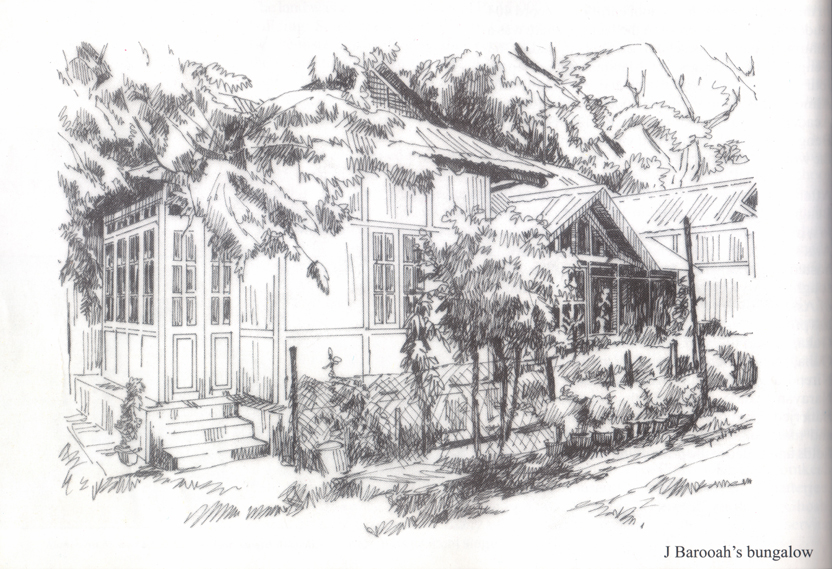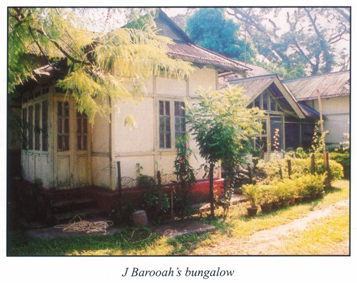| A SCHOLARíS ABODE |
 |
On the northeastern side of Dighalipukhuri stands an old bungalow that was, in the first quarter of the 20th century, the nerve center of Guwahati’s socio-culture life. The cool breeze of the Brahmaputra kissed every nook and corner of the bungalow while birds and butterflies danced on its lawns.
It was the home of Jnanadabhiram Barooah, bar-at-law, former Extra Assistant Commissioner and munsiff of Guwahati, and the first principal of Earle Law College, the first law college of northeast India. The Earle Law College that was established in 1914 first started classes in the premises of the Cotton College, after which a prime plot of land was acquired on the banks of the Dighalipukhuri for both college building and principal’s residence. An amount of Rs 63,000 was sanctioned towards cost of land, first phase of college building and the principal’s residence, a by 1915 construction of both the college and principal’s residence was completed.
|
The principal’s bungalow was a spacious one that faced the college and Jnanadabhiram Barooah, founder-principal of the college, was its first occupant. Commoners knew it as Barooah sahabar bongla (Baruah Saheb’s bungalow) while intellectuals called it Jnan Barooahar howli (Jnan Barooah’s house). J Barooah had a towering personality. The youngest Assamese to have gone to English in those days (at the age of 16 only) to study at Grey College, he was a living legend. Obviously therefore his official residence was the most frequented home of the who’s who of Assam’s socio-cultural life, and the hub of multifarious academic, literary and cultural activities. socio-cultural life, and the hub of multifarious academic, literary and cultural activities. |
|
When Jyotiprasad Agarwalla was making Joymati, the first Assamese film, Jnan Barooahar howli became his haunt. Scripts for his next film, Indramalati (in which Barooah acted), were also read and given final shape in this howli. During that time an idea was also floated that some scenes of the film be shot inside the beautiful bungalow; but it was abandoned since the bungalow was essentially a government premise. Barooah’s personal chair and electric table fan however were taken from this bungalow for the sets of movie.
Personalities like Kamalakanta Bhattacharyya, Chandra Kumar Agarwalla, Hem Chandra Goswami, Tarun Ram Phookun and Benudhar Sarmah were frequent visitors to the bungalow. Litterateur Lakshminath Bezboruah also stayed with Jnanadabhiram Barooah occasionally during his visits to Guwahati. So did Acharya Prafulla Chandra Roy and Sir Ashutosh Mukherjee.
In the year 1919, when Rabindranath Tagore came to Guwahati he stayed at the bungalow as Jnanadabhiram Barooah’s guest for three days. Many a lively discussion was held with all who flocked to meet the Nobel Laureate on the howli’s lawns, and at once such sitting Ambikagiri Roychowdhury even sang a borgeet at Tagore’s request. In an interesting observation literateur Atul Chandra Hazarika once wrote, “Since many people used to visit the bungalow it became the hunting ground of insurance agents.”
Barooah, who was chief patron of the Earle Law College Drama Club, personally supervised the rehearsals that were held on the bungalow’s lawns. AE Brown, Professor of Economics, Cotton College who also taught at the Law College, spent many evenings here to Economics, Cotton College who also taught at Law College, spent many evenings here to learn Assamese and rehearse for the Assamese drama Hemaprabha in which he played the role of David Scot at Barooah’s request.
Although a British government servant and sahib in attire and appearance, J Barooah was at heart a fearless swadeshi. He was possibly the only Assamese who dared to arrange a jatra performance by Mukunda Das, the famous nationalist singer of Bengal, in the lawns of his official residence to which he even invited British officials, including one Mr. Bentinck.
|
At the performance there was a large gathering of citizens and students and when Mukunda das sang Bande Mataram, Bentinck was the first person to stand up and show respect. The next day when Barooah engaged a class he asked the students what they had learnt from Bentinck’s gesture the previous evening. Finding no reply, Barooah explained, “ Bentinck’s gesture reflects the liberated outlook of citizens of an independent nation while our belated response to our song reflects the mindset of a subjugated nation.” When Gauhati University was established, some classes of the university were held in the Law College premises. Gopinath Bordoloi, Birinchi Kumar Baruahand many other luminaries used to visit the bungalow that was used as the Office of the Secretary of Gauhati University at that time. Later, it was used as the Office of Inspector of Schools of Lower Assam. At present this great heritage building is the official residence of the Superintendent of the Nalinibala Devi Girls’ Hostel of Cotton College. |
|
%20in%20J%20Barooah's%20bungalow.jpg)
